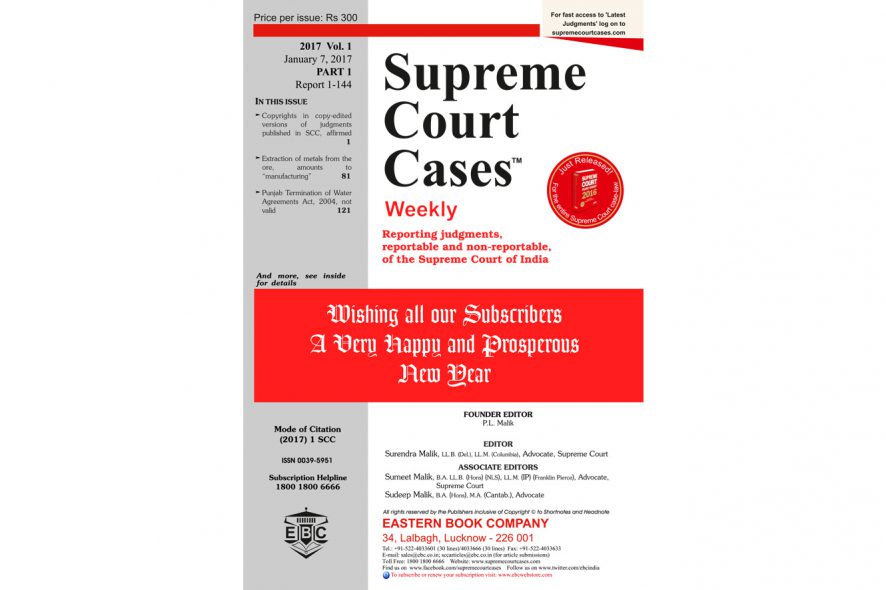Arbitration and Conciliation Act, 1996 — Ss. 36 and 34 (before and after amendment of S. 36 in 2015): S. 36 as amended in 2015, applies to pending S. 34 applications even in arbitrations commenced prior to 23-10-2015 i.e. date of coming into force of Amendment Act, 2015, as S. 36 is a procedural provision. Rule of automatic stay of operation of award on filing of S. 34 application, even in absence of an order of stay/imposition of conditions by court as per unamended S. 36, held, is no longer applicable. [BCCI v. Kochi Cricket (P) Ltd., (2018) 6 SCC 287]
Constitution of India — Arts. 32 and 21 — Issue of writs — Habeas corpus — Custody of petitioner — Found clearly illegal: Order related custody of petitioner is non est, nullity and without any jurisdiction. Petitioner’s right under Art. 21 stands offended, as he was detained in custody by adopting totally faulty and illegal process. Petitioner directed to be released forthwith. [Champion R. Sangma v. State of Meghalaya, (2018) 6 SCC 348]
Criminal Procedure Code, 1973 — S. 406 — Transfer petitions — Apprehension of not getting a fair and impartial inquiry or trial besides inconvenience of petitioner in pursuing cases — Grounds of: Such apprehension is required to be reasonable and not based upon conjectures and surmises. Convenience for purposes of transfer means convenience of prosecution, other accused, witnesses and larger interest of society. Court has to visualise comparative inconvenience and hardships likely to be caused to witnesses besides burden to be borne by State Exchequer in making payment of travelling and other expenses of official and non-official witnesses, for attending court proceedings, if cases are ordered to be transferred to transferee court. [Harita Sunil Parab v. State (NCT of Delhi), (2018) 6 SCC 358]
Infrastructure Laws — Energy and Power — Electricity — Connection/Disconnection/Reconnection — Electricity connection: Authorities, held, should point out all defects while rejecting application for electricity connection. [D. Saravanan v. TANGEDCO, (2018) 6 SCC 352]
Land Acquisition Act, 1894 — S. 48 r/w Ss. 4, 6 and 9 — Withdrawal from acquisition — When is fraudulent: Withdrawal of acquisition for the benefit of builders/private entities, not permissible, when it through an unholy nexus between the government machinery and builders/private entities deprives innocent and gullible landholders. [Rameshwar v. State of Haryana, (2018) 6 SCC 215]
Motor Vehicles Act, 1988 — Ss. 14(2)(b) and 149 — Statutorily mandated validity period of driving licence (DL) vis-à-vis errors made while issuing DL: As per S. 14(2)(b) licence issued should be for a period of 20 yrs or up to age of 50 yrs whichever is earlier. Date of issuance of original licence in this case was 27-2-1998 and date of birth of driver recorded in licence was 30-4-1961. Hence, licence would had been valid till 29-4-2011 as per statutory mandate, licensing authority erroneously issued DL for a period of 5 yrs when driver concerned was only 37 yrs but since petitioner attained age of 50 yrs on 30-4-2011, licence mentioned expiry date as 29-4-2011. Accident took place on 12-11-2005. High Court judgment setting aside award on ground of invalid licence, reversed. Thus, direction of High Court to recover amounts paid by insurance company to third party injured from appellant (owner of vehicle), set aside. [Compaq International v. Bajaj Allianz General Insurance Co. Ltd., (2018) 6 SCC 342]
Statute Law — Validating or Overriding Enactment/Statute/Legislation — Validating Act — Power to enact — Scope — Supersession by legislature, of a judicial verdict — Permissible limits of — Principles summarized: Though legislature has power to enact validating laws including power to amend laws with retrospective effect and thereby remove causes of invalidity i.e. correct errors/mistakes committed in earlier legislation as pointed out by court in a judgment, the effect of which is to remove the basis and foundation of said judgment, but it cannot overturn or set aside that judgment, that too retrospectively by introducing a new provision in the Act concerned. What the legislature can do is that it can amend the provisions of the statute to remove the basis of the judgment. A judicial pronouncement is always binding unless the very fundamentals on which it is based are altered and the decision could not have been given in the altered circumstances. [State of Karnataka v. Karnataka Pawn Brokers Assn., (2018) 6 SCC 363]
Tenancy and Land Laws — Land Grabbing — Frivolous litigation: In this case as there is prolongation of fruitless litigation by the appellants in different forums, no interference is warranted. [M. Durga Singh v. Yadagiri, (2018) 6 SCC 209]






